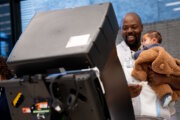Mei Tsai, 41
Title: Geriatric certified pharmacist in the skilled nursing facility and the intensive care unit at Torrance Memorial Medical Center
Location: Torrance, California
Tsai coordinates the administration of COVID-19 vaccines to people who are homebound.
As told to Ruben Castaneda, as part of U.S. News & World Report’s “One Pandemic Question” series. Responses have been edited for length and clarity.
Q: What have you learned by bringing vaccines to people who are homebound?
I’ve learned how precious each person is and how valuable each day is to our community members who are homebound. We’ve been preparing vaccines and bringing them to residents in their homes since March. This has been a group effort, involving our home health team, the Torrance Fire Department, skilled nursing facility nurses and pharmacists.
As of late May we’ve done over 220 homebound vaccinations. I know this doesn’t sound like a lot, but it is a very labor-intensive process to schedule home visits and prepare and reposition vaccines. The vaccines need to be kept in a cooler at the right temperature, and you only have a six-hour window to use the syringes. There’s a lot of paperwork and details to keep track of when you’re moving COVID-19 vaccines around.
[Read: COVID-19: ‘Seared Into My Brain.’]
The residents we bring the vaccines to are so grateful. A 90-year-old homebound woman just started crying when I called her to tell her we were coming to vaccinate her. She said she felt like she’d just won the lottery. She said there are so many others like her who can’t make it to a clinic.
One of the biggest challenges is to identify who needs the vaccine brought to them. The Los Angeles County Department of Public Health has given us lists of patients who have reached out for vaccines. We’ve gotten names from Meals on Wheels, independent living facilities and the regional center for developmentally disabled people. The Torrance Fire Department has reached out to organizations for names of homebound people who want the vaccine and has also set up a hotline.
We call every person on the lists we’re given. For every 10 patients we call, only one or two need the vaccine. Some have already been vaccinated, some people don’t want the vaccine. Some patients are admitted to the hospital for conditions other than COVID-19. A lot of homebound patients are frail and timing the vaccine to when they are feeling strong enough to receive it is important.
There’s a misconception that homebound residents don’t need the vaccine because they don’t go out much, they stay in their apartments or houses. But many haven’t seen their family, their grandkids or kids in over a year. Each and every day they have with their loved ones is so valuable.
[Read: Unsung Heroes Fight the COVID-19 Pandemic.]
I don’t think when we started this we understood the extent of what this vaccine meant to residents who can’t leave their homes. Most of them are older. A huge portion of them are in their 80s and 90s and many have chronic conditions, like cancer or diabetes. This vaccine means freedom to see their family and friends again.
We’ve also had parents reach out for us to vaccinate their children with autism. A lot of patients with autism just can’t stand having a mask on for even a short amount of time, which is a requirement for most clinics.
When the vaccine first became available, many people were rushing to get it, some were trying to jump the line. Homebound people often had to wait for a phone call. Most didn’t know how to reach out or even who to ask to come give them a home vaccination. Some of the residents we’ve vaccinated didn’t know how we got their name. A resident recently asked how did we get her name. I told her the health department provided it. She said she didn’t call anyone herself; she thought maybe a neighbor called for her. It happens a lot, neighbors or family members call for people who are homebound.
[Read: Mother-Daughter Nurse Team Both Treating Coronavirus Pandemic.]
For our patients, this vaccine is life-changing. But it’s also been life-changing for the clinical staff and the fire department members who are a part of this. Stella Kim, a clinical pharmacist, came back after administering a vaccine to a homebound patient and said it was one of the most heart-warming and rewarding experiences she’s ever had. She said, ‘There’s nothing in my life I can complain about after helping the patients I met today.’
For a lot of us who have worked in the hospital through COVID-19, this program is providing a ray of optimism. It’s brought us a lot of hope for a better future. We are incredibly grateful to our hospital and our community for sending the message that these patients with special needs are important. Being a part of this effort has been amazing, and it has been an honor to do it.
More from U.S. News
Coronavirus Prevention Steps That Do or Do Not Work
What Weakens the Immune System?
Pharmacist Helps Bring COVID-19 Vaccines to Homebound Patients originally appeared on usnews.com







